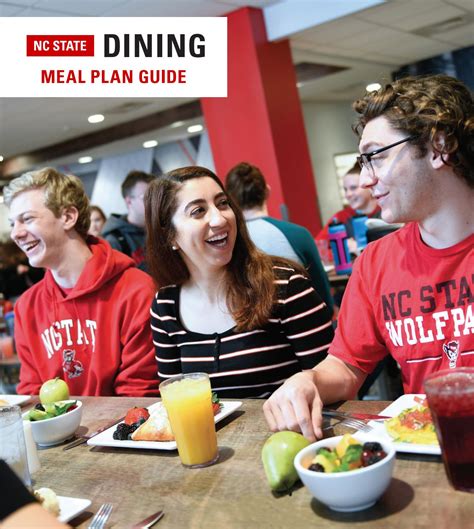Navigating the Maze of Meal Plans at NC State

For students at North Carolina State University, finding the right meal plan can be a daunting task. With a plethora of options to choose from, it’s easy to get lost in the sea of choices. This comprehensive guide aims to demystify the NC State meal plan landscape, empowering students to make informed decisions that align with their dietary needs and budget.
Understanding Meal Plans
Meal plans are designed to provide students with a convenient and flexible way to dine on campus. They offer varying levels of meal swipes, dining dollars, and special perks. Meal swipes can be used at dining halls and certain retail locations, while dining dollars can be spent on food and beverages at various campus eateries.
Types of Meal Plans
NC State offers a range of meal plans tailored to different lifestyles and dietary preferences:
- Traditional Meal Plans: These plans provide a set number of meal swipes, dining dollars, and Wolfbucks (campus currency). They are best suited for students who want the convenience of having a pre-determined dining budget.
- Flex Meal Plans: These plans offer a higher level of flexibility, allowing students to choose the number of meal swipes they purchase. They are ideal for students who prefer to have more control over their dining expenses.
- Block Meal Plans: These plans provide a large number of meal swipes at a discounted rate. They are suitable for students who plan to eat most of their meals on campus.
Meal Plan Costs
The cost of NC State meal plans varies depending on the plan type and the number of meal swipes and dining dollars included. For the 2023-2024 academic year, meal plan prices range from approximately $1,900 to $3,000.
Meal Plan Perks
In addition to meal swipes and dining dollars, NC State meal plans offer a variety of perks to enhance the student dining experience:
- Wolfbucks: Each meal plan includes a certain amount of Wolfbucks, which can be used at various campus eateries, including food trucks, coffee shops, and convenience stores.
- Dining Dollars Rollover: Unused dining dollars from the fall semester roll over to the spring semester, providing students with additional flexibility.
- Guest Passes: Meal plans allow students to purchase guest passes for a fee, enabling them to share meals with friends or family.
Choosing the Right Meal Plan
Selecting the optimal meal plan involves considering several factors:
- Dietary Needs: Do you have specific dietary restrictions or preferences? Consider plans that offer vegetarian, vegan, or gluten-free options.
- Dining Habits: How often do you eat on campus? If you plan to dine frequently, a traditional meal plan with a higher number of meal swipes may be a good choice.
- Budget: Meal plans vary in price. Determine how much you are willing to spend on dining and choose a plan that fits your financial constraints.
Tips and Tricks
- Take Advantage of Discounts: NC State offers discounts on meal plans for students who sign up early or purchase a larger plan.
- Maximize Dining Dollars: Use dining dollars to purchase healthy snacks, grab-and-go items, or meals at select campus eateries.
- Utilize Block Meal Plans: If you anticipate eating most of your meals on campus, consider a block meal plan to save money on meal swipes.
- Use Guest Passes Wisely: Guest passes should be used sparingly to avoid exceeding your dining budget.
- Monitor Your Balance: Regularly check your meal plan balance online or through the NC State Dining app to avoid running out of swipes or dining dollars.
Why Meal Plans Matter
Meal plans play a crucial role in the overall student experience at NC State. They provide:
- Convenience: Meal plans eliminate the hassle of cooking or searching for food off campus, saving students time and energy.
- Budget Management: Meal plans help students control their dining expenses and avoid overspending.
- Campus Involvement: Dining on campus fosters a sense of community and allows students to connect with others while enjoying their meals.
- Nutritional Support: Meal plans ensure that students have access to nutritious meals, promoting their overall health and well-being.
Conclusion
Navigating the NC State meal plan landscape can be a breeze with the right information. By understanding the different plan types, costs, and perks, students can make informed choices that empower them to relish the campus dining experience while staying within their budget. Remember, the optimal meal plan is the one that aligns with your dietary needs, dining habits, and financial constraints. Embrace the convenience and benefits of NC State meal plans and unlock a world of culinary possibilities on campus.
Meal Plan Options at a Glance
| Plan Type | Meal Swipes | Dining Dollars | Wolfbucks | Guest Passes |
|---|---|---|---|---|
| Traditional 150 | 150 | $200 | $100 | 5 |
| Traditional 190 | 190 | $250 | $100 | 7 |
| Traditional 225 | 225 | $300 | $100 | 10 |
| Flex 100 | 100 | $400 | $100 | 5 |
| Flex 125 | 125 | $500 | $100 | 7 |
| Block 500 (fall only) | 500 | $200 | $100 | 20 |
Frequently Asked Questions About Meal Plans
Q: Can I use my meal swipes at all dining locations on campus?
A: No, meal swipes can only be used at designated dining halls and certain retail locations.
Q: What happens if I run out of meal swipes?
A: You can purchase additional meal swipes at a discounted rate.
Q: Are dining dollars taxable?
A: No, dining dollars are tax-free.
Q: Can I share my meal plan with another student?
A: No, meal plans are non-transferable.
Q: What are Wolfbucks used for?
A: Wolfbucks can be used at various campus eateries, including food trucks, coffee shops, and convenience stores.
